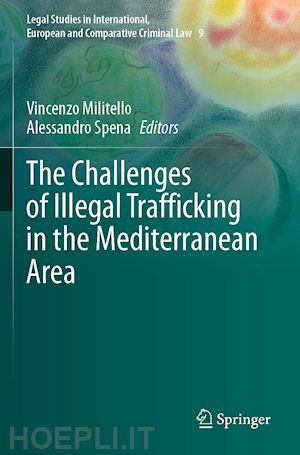

Questo prodotto usufruisce delle SPEDIZIONI GRATIS
selezionando l'opzione Corriere Veloce in fase di ordine.
Pagabile anche con Carta della cultura giovani e del merito, 18App Bonus Cultura e Carta del Docente
The book deals with illicit trafficking in the Mediterranean, seen as a borderline issue between mobility and security under a strongly interdisciplinary approach. The opening part is dedicated to issues that transversally concern illegal trafficking: criminological, criminal law, criminal procedure, but also international law issues. This part presents a kind of general theory of illegal trafficking, showing its recurring aspects and identifying the legal and criminal-political issues that would be best addressed by a unified approach to the matter. The other parts are devoted to presenting, instead, a special part overview of illegal trafficking. The second and the third section are devoted, in particular, to illegal traffics having human beings as their objects. More specifically, the second part examines smuggling of migrants, which has a central - criminological and criminal-political - relevance among the illegal traffics taking place in the Mediterranean. The third part dealswith the neighbouring theme of human trafficking, especially in its connection with the problem of labour exploitation. Finally, the fourth part focuses on some trafficking in goods, offering a selected and representative overview of some of the most significant forms that such trafficking can take: tobacco trafficking, drug trafficking and trafficking in cultural goods.
Introduction 1 The illicit trades of people and goods in the Mediterranean and the transnational criminal organizations.- Section I – Jurisdictional issues.- 2 Territorialising the extraterritorial: the role of “suppression” conventions.- 3 Adjudicative Jurisdiction for crimes at sea: an international law perspective.- 4 Coercive powers and jurisdiction on the high seas to combat human smuggling.- Section II – Migrant smuggling.- 5 Anti-smuggling penal policies: a cross-national exploration.- 6 Facilitation of irregular immigration vs. organised smuggling of migrants: is this dichotomy relevant to the interpretation of Italian criminal law?.- 7 Challenging the hostile environment for search and rescue at sea: reflections from the Sea Watch litigation.- Section III – Human trafficking and labour market.- 8 The Problems of trafficking in human beings in Spain. Criminal regulations and Jurisprudential treatment.- 9 Organised crime, illicit manpower brokerage and recent Italian legislation.- 10 International and domestic perspectives to combat gangmaster systems.- Section IV – Traffickings of goods and human organs.- 11 Soft drugs and organized crime: a problematic relationship.- 12 Trafficking in cultural property. An evolving international legal framework.- 13 The criminal policy on trafficking in cultural goods14 Trafficking in human organs – a Portuguese perspective.
Vincenzo MILITELLO
Professor of Criminal Law at the University of Palermo (Law School). Alexander von Humboldt Fellow (1996-1997), Jean Monnet Fellow (2015-2018; 2019-2021) and since 1984 repeatedly Senior Visiting Fellow at the Max Planck Institut for International and Foreign Criminal Law (now for the Study of Crime, Security and Law) in Freiburg (Germany). Author of many publications, also in international journals and books, in the fields of Criminal Law and of Comparative, European and International Criminal Law about various topics (e.g. Negligence, Causality, Risk, Sentencing; Economic crime; Transnational Organized Crime). Co-Director of the Book series “Quaderni di diritto penale comparato, internazionale ed europeo” and member of several editorial boards of criminal justice journals (e.g. Goltdammer’s Archiv für Strafrecht, Revista portuguesa de ciencia criminal; Rivista trimestrale diritto penale dell’economia). Principal investigator of European and International Research Projects (European Joint Project on Transnational Organized Crime in the EU Falcone-program), IFO - Illegal Flow Observations, GLODERS-Global Dimensions of Extortion Racket Systems, NESMeS- The New Era of Smuggling on Mediterranean Sea; EUBeMS - Europe between Mobility and Security: the Challenges of Illicit Trades in the Mediterranean Area). Lecturer at national and international conferences in twenty countries. Moreover, Honorary Consul of the Federal Republic of Germany in Palermo.
Alessandro SPENA
Professor of Criminal law at the University of Palermo. Senior Visiting Fellow at Nathanson Centre on Transnational Human Rights, Crime and Security (York University, Toronto - 2012); Jemolo Fellow at Nuffield College (Oxford University - 2013); Senior Visiting Fellow at Max Planck Institute for the Study of Crime, Security and Law, Freiburg i.Br. (2024). Coordinator of the Jean Monnet Center of Excellence “Europe between Mobility and Security: The Challengesof Illicit Trades in the Mediterranean Area (EUMoSIT)” (2019 - 2022) (P.I. Vincenzo Militello), based at the University of Palermo. Project Manager of the Jean Monnet Module on “Mobility, Security and the new media” (2015-2018) (P.I. Vincenzo Militello), based at the University of Palermo. He has extensively written, among other things, on corruption, hate speech, criminalization of migration and the relationships between fundamental rights and criminal law.











Il sito utilizza cookie ed altri strumenti di tracciamento che raccolgono informazioni dal dispositivo dell’utente. Oltre ai cookie tecnici ed analitici aggregati, strettamente necessari per il funzionamento di questo sito web, previo consenso dell’utente possono essere installati cookie di profilazione e marketing e cookie dei social media. Cliccando su “Accetto tutti i cookie” saranno attivate tutte le categorie di cookie. Per accettare solo deterninate categorie di cookie, cliccare invece su “Impostazioni cookie”. Chiudendo il banner o continuando a navigare saranno installati solo cookie tecnici. Per maggiori dettagli, consultare la Cookie Policy.